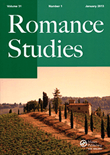
Romance Studies
Scope & Guideline
Navigating the Landscape of Romance Cultures and Theories
Introduction
Aims and Scopes
- Interdisciplinary Approaches to Romance Languages and Cultures:
The journal publishes research that integrates various disciplines, including literature, history, and cultural studies, to explore the complexities of romance languages and their cultural manifestations. - Historical Contextualization of Literary Works:
A significant focus is on understanding literary texts within their historical contexts, particularly how sociopolitical factors influence literary production and reception in the romance-speaking world. - Gender Studies and Feminist Perspectives:
The journal frequently addresses gender dynamics and feminist interpretations, engaging with themes of identity, power, and representation in romance literatures. - Migration and Diaspora Narratives:
Research exploring the impact of migration and diaspora on language and identity formation is a core area, reflecting contemporary sociocultural issues. - Memory and Trauma in Literature:
The journal examines the themes of memory and trauma, particularly in relation to historical events, through the lens of literary analysis.
Trending and Emerging
- Environmental and Ecocritical Studies:
There is a rising interest in ecocritical approaches, focusing on how literature engages with environmental issues and sustainability, reflecting a global concern for ecological challenges. - Digital Humanities and New Media:
The integration of digital humanities and new media studies is increasingly prevalent, showcasing how technology influences the production and dissemination of romance literature. - Intersectionality and Diversity:
Research addressing intersectionality, particularly regarding race, gender, and class within romance literatures, is gaining traction, reflecting a commitment to inclusivity and representation. - Transnational and Transcultural Studies:
The journal is increasingly focused on transnational and transcultural exchanges, examining how romance languages and cultures interact and influence one another in a globalized context. - Postcolonial and Decolonial Perspectives:
Emerging themes include postcolonial and decolonial frameworks that interrogate the legacies of colonialism in romance literatures, emphasizing the voices and narratives of marginalized communities.
Declining or Waning
- Traditional Historical Narratives:
There is a noticeable decrease in articles focusing solely on traditional historical narratives without critical engagement, as scholars increasingly seek to incorporate interdisciplinary perspectives. - Purely Linguistic Studies:
The focus on purely linguistic studies, divorced from cultural or historical contexts, has waned, reflecting a broader trend towards interdisciplinary research. - Exclusively Theoretical Frameworks:
Papers that apply theoretical frameworks without empirical or practical case studies are less frequent, as the journal encourages grounded research that connects theory with real-world applications.
Similar Journals
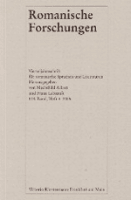
ROMANISCHE FORSCHUNGEN
Advancing Knowledge in Romance Language StudiesROMANISCHE FORSCHUNGEN, published by VITTORIO KLOSTERMANN GMBH, stands as a key scholarly journal in the fields of linguistics and literary studies, focusing particularly on Romance languages and literature. With an ISSN of 0035-8126 and an E-ISSN of 1864-0737, this journal is vital for researchers and scholars seeking to explore and advance their understanding of the nuances within Romance language studies. Operating from its base in Frankfurt am Main, Germany, ROMANISCHE FORSCHUNGEN features a robust publication history from 2002 to 2024. While currently categorized in Q4 within both Linguistics and Language and Literature and Literary Theory for 2023, the journal aims to cultivate a scholarly dialogue that bridges these disciplines, fostering an environment for innovative and critical inquiry. Although not an open-access journal, it serves as a crucial resource for professionals and students dedicated to Romance philology and comparative literature.

GERMANISCH-ROMANISCHE MONATSSCHRIFT
Bridging Germanic and Romance Traditions in Academic ResearchGERMANISCH-ROMANISCHE MONATSSCHRIFT, published by UNIVERSITATSVERLAG C WINTER HEIDELBERG GMBH, is a vital academic journal dedicated to the fields of linguistics, literature, and literary theory. With its ISSN 0016-8904, this journal fosters scholarly discussions and disseminates innovative research that intersects Germanic and Romance languages and literatures. While it does not currently offer Open Access options, its contributions have positioned it within the Q4 quartile in both Linguistics and Language, and Literature and Literary Theory according to the 2023 category rankings. The journal's Scopus ranking reflects its emerging place within the academic community, situated at the 40th percentile for Literature and Literary Theory, and the 20th and 18th percentiles within Language and Linguistics, respectively. Scholars and students are encouraged to engage with this resource as it offers a platform for new perspectives that are pivotal to understanding the complex interrelations of these linguistic traditions, enriching both teaching and research initiatives.
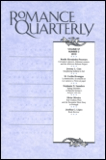
ROMANCE QUARTERLY
Unveiling the Rich Tapestry of Romance ScholarshipROMANCE QUARTERLY is an esteemed journal published by Routledge Journals, Taylor & Francis Ltd, focusing on critical discussions and innovative research in the fields of Cultural Studies and Literature and Literary Theory. With its inception in 1986, this journal has diligently documented the evolving landscape of romance literature, making significant contributions through interdisciplinary approaches that resonate across literature and cultural scholarship. Holding a commendable position in academic rankings, it is classified in the second quartile for Literature and Literary Theory, and in the third quartile for Cultural Studies as of 2023, highlighting its relevance and impact within these domains. While it operates under a traditional access model, the required scholarly discourse and access to contemporary studies make it a crucial resource for researchers, educators, and students alike. ROMANCE QUARTERLY serves not merely as a platform for publishing but as a vibrant hub for the exploration and analysis of romance narratives, offering invaluable insights into their impact on cultural and societal constructs, surely a must-read for anyone passionate about these subjects.
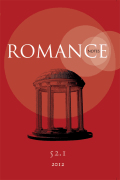
ROMANCE NOTES
Celebrating the Art of Romance Languages Through ScholarshipROMANCE NOTES is a prominent journal published by the University of North Carolina, dedicated to the study of Literature and Literary Theory. Since its inception in 1975, the journal has evolved to encompass critical and interdisciplinary perspectives on romance languages, examining both classic and contemporary texts. Aiming to bridge scholarly discourse and literary practice, ROMANCE NOTES invites contributions that explore various dimensions of language, culture, and artistic expression, making it an essential resource for researchers, professionals, and students alike. With an established presence in the academic community and a current ranking of Q3 in its category for 2023, it serves as a vital platform for emerging scholarship. The journal, based in Chapel Hill, North Carolina, continues to foster a rich dialogue within the field, offering an invaluable contribution to the understanding of romance languages and their literary significance.
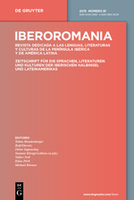
IBEROROMANIA
Navigating the Rich Tapestry of Romance Linguistics and LiteratureIBEROROMANIA, published by WALTER DE GRUYTER GMBH, stands as a pivotal journal in the fields of Linguistics and Language and Literature and Literary Theory. Since its inception in 1969, IBEROROMANIA has facilitated scholarly discourse by providing a platform for cutting-edge research that explores the complexities of Romance languages and their literatures. The journal is recognized for its valuable contributions, currently holding a Q3 quartile ranking in Linguistics and Language and a Q2 ranking in Literature and Literary Theory as of 2023. With its diverse scope spanning several years, including works from 1970 to 2024, IBEROROMANIA is pivotal for researchers, professionals, and students alike, fostering a deeper understanding of Romantic linguistic and literary frameworks. Although it does not provide open access, its impact in the Arts and Humanities is underscored by its Scopus rankings, reflecting a commitment to high-quality scholarship. For those dedicated to exploring the nuances of Romance languages and literature, IBEROROMANIA is an indispensable resource.
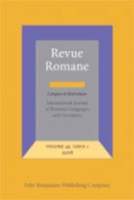
REVUE ROMANE
Exploring the Nexus of Language and LiteratureREVUE ROMANE is a prestigious academic journal published by John Benjamins Publishing Co, located in the Netherlands. With a rich heritage dating from 1996 to 2024, this esteemed journal focuses on the dynamic interplay of *Linguistics* and *Literature*, making it an essential resource for scholars, researchers, and students alike. By showcasing a range of theoretical and empirical studies, the journal has positioned itself in the Q3 and Q2 quartiles for *Linguistics and Language* and *Literature and Literary Theory* respectively, reflecting its significant impact on these fields. With impressive Scopus rankings, including a notable 79th percentile in Arts and Humanities within Literature and Literary Theory, REVUE ROMANE serves as a critical platform for the exploration of both language and literary expressions, encouraging dialogues that bridge cultural and linguistic divides. Although it is not open access, its contributions are invaluable for advancing knowledge and fostering scholarly discourse in the realms of linguistic and literary investigation.
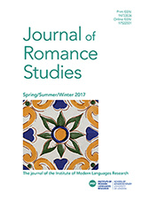
Journal of Romance Studies
Unveiling the Rich Tapestry of Romance CulturesJournal of Romance Studies, published by Liverpool University Press, is a significant forum for scholarly discourse within the realms of cultural studies, linguistics, literature, and the visual and performing arts. With an ISSN of 1473-3536 and an E-ISSN of 1752-2331, this journal aims to bridge various interdisciplinary approaches, fostering insights into the richness of Romance languages and their cultural contexts. Although it holds a Q4 designation across several categories in the 2023 rankings, the journal continues to serve as a platform for emerging researchers and established scholars alike to contribute to the evolving narrative of Romance studies. Published annually, it ensures access to a diverse body of research that underpins the understanding and critique of Romance languages and cultures. Join a community committed to exploring these vital areas of inquiry, as the journal actively engages with contemporary issues shaping the landscape of Romance studies.

Jordan Journal of Modern Languages & Literature
Showcasing Excellence in Language and Literary ResearchJordan Journal of Modern Languages & Literature is a prestigious academic journal published by Yarmouk University, Deanship of Research & Graduate Studies. This journal serves as a vital platform for scholars and researchers in the fields of linguistics and literature, offering a well-rounded examination of modern languages and literary theory. With an impressive Q2 ranking in Linguistics and Language and a Q1 distinction in Literature and Literary Theory as of 2023, it consistently features high-quality research that contributes to the advancement of knowledge in these domains. The Scopus rankings further reflect its academic rigor, placing it in the 79th percentile for Literature and Literary Theory and maintaining significant influence in related fields, making it an essential resource for researchers, professionals, and students alike. Although it does not operate under an open-access model, the journal's commitment to publishing groundbreaking studies can significantly aid in the understanding and progression of modern linguistic and literary practices. The Jordan Journal of Modern Languages & Literature continues to be an influential voice in fostering scholarly dialogue and advancing research in the humanities.

Etudes Romanes de Brno
Exploring the Depths of Linguistics and LiteratureEtudes Romanes de Brno, published by Masaryk University, Faculty of Arts, is a distinguished academic journal that has been contributing to the fields of Linguistics and Language as well as Literature and Literary Theory since its inception. With an ISSN of 1803-7399 and E-ISSN 2336-4416, this open-access journal has been a valuable resource for scholars since 2009, enhancing accessibility to a broad audience of researchers and students in the Czech Republic and beyond. The journal's impact is underscored by its categorization in the Q2 and Q3 quartiles for literature and linguistic studies as of 2023, reflecting its commitment to rigorous academic discourse. With Scopus rankings placing it in the 57th and 31st percentiles for its respective fields, it continues to attract high-quality submissions that explore contemporary issues in literary studies and language analysis. Etudes Romanes de Brno promises to remain an essential platform for the exchange of scholarly ideas, fostering growth and innovation in the humanities.

Slavia Meridionalis
Connecting minds across Anthropology, Linguistics, and Literature.Slavia Meridionalis is a distinguished open-access journal published by the Polish Academy of Sciences, Institute of Slavic Studies, dedicated to advancing scholarly discourse in the fields of Anthropology, Cultural Studies, History, Linguistics and Language, and Literature and Literary Theory. With its ISSN 1233-6173 and E-ISSN 2392-2400, this journal has made significant strides in promoting research since its inception in 2014. Operating from Warsaw, Poland, Slavia Meridionalis aims to serve as a pivotal platform for researchers and students alike, fostering interdisciplinary collaboration and knowledge dissemination. The journal holds respectable rankings in its various categories, some achieving Q3 status, which reflects its commitment to quality scholarship within the academic community. By providing open access to its readership, Slavia Meridionalis ensures that pivotal research is readily available for the global audience, thus enhancing its relevance and impact across diverse fields.